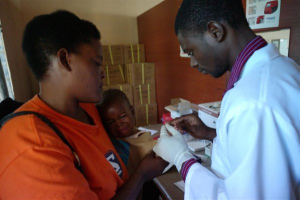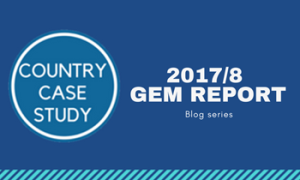Many adolescents living with AIDS do not receive adequate support and care – and many others are not aware of how to protect themselves from AIDS. To mark World AIDS Day, we look at how education – especially of girls – helps save lives by improving knowledge of HIV/AIDS among young people.
On December 1, World AIDS Day, it’s important to acknowledge how much progress has been made in prevention, treatment and care. The number of new HIV infections has fallen by a third since 2001, and by half among children. The number of AIDS-related deaths has dropped by 30% since 2005. In low and middle income countries, 10 million people are receiving life-saving antiretroviral treatment; the United Nations is set to exceed its goal of ensuring that 15 million people receive treatment by 2015.
There are still 34 million people living with HIV, however, and many countries still have high prevalence rates. As the World Health Organization is underlining on World AIDS Day this year, children and adolescents are particularly vulnerable: 3.3 million children are affected, and young people account for 41% of all new HIV infections among adults. Education is a crucial part of efforts to prevent AIDS among young people, and improve care for those living with HIV and AIDS, as the UN General Assembly and the Dakar Framework for Action have acknowledged.
How does education help? Adolescents who know more about HIV/AIDS are more likely to get tested. Education also reduces the discrimination against HIV-positive children and adolescents that can lead them to drop out of school. In Latin America, people with secondary education are 45% more tolerant towards HIV-positive people than those with only primary education.
Evidence from several EFA Global Monitoring Reports shows that educating girls saves lives, especially by improving HIV prevention and care. Young women account for more than 60% of young people living with HIV; in sub-Saharan Africa the figure is 71%. Educating young women reduces the risk of HIV infection by empowering them to assert their sexual and reproductive rights. They are more likely to know how HIV is transmitted and that using condoms can reduce the risk of transmission.
Educating girls could also have prevented the 260,000 new HIV infections among children last year, as the vast majority of these children contracted the virus during pregnancy or delivery, or when breastfed by HIV-positive mothers. Our Education Transforms booklet highlights that education is one of the most powerful ways of improving children’s health as educated mothers are better informed about specific diseases and therefore can take measures to prevent them.
In the case of HIV, educated mothers are more likely to seek testing during pregnancy and to know that HIV can be transmitted by breastfeeding. They are also more likely to know that the mother-to-child transmission can be reduced by taking anti-retroviral drugs during pregnancy; only 27% of women with no education in Malawi were aware of this, compared with 60% of women with secondary education or higher.
Ensuring all children have access to school is essential, as young people who have stayed in school longer are more aware of HIV and AIDS. They are more inclined to take protective measures such as using condoms, getting tested and discussing AIDS with their partners. Schooling reduces the risk of HIV infection – but needs to play a bigger part in communicating knowledge about HIV and AIDS.

Mother getting her child checked for Malaria after his HIV test. Educated mothers are better informed about specific diseases and therefore can take measures to prevent them. ©UNICEF/Christine Nesbitt 2011
The 2012 EFA Global Monitoring Report revealed that only 36% of 13-year-olds in Southern and Eastern Africa reached the minimum required knowledge of HIV and AIDS and only 7% reached the desirable level. Curricula must be better designed to incorporate health, sexuality, and HIV and AIDS education, using a life skills approach. Botswana introduced an HIV and AIDS awareness curriculum in 2006. Knowledge of HIV and AIDS among young people rose from 28% to 45%, and the HIV infection rate was halved between 2001 and 2009.
To push for more national programmes like Botswana’s, UNESCO has launched an initiative with UNAIDS in Southern and Eastern Africa – where every hour still brings 50 new HIV infections among young people. The initiative urges policy-makers to combine comprehensive sex education for young people with youth-friendly health services. Their report, Young People Today – Time to Act Now, highlights the need for links between education, health and an environment that helps young people and communities face the issue.





To achieve the MDGs before and after 2015, HIV/ AIDS must be a thing of the past. We should involve more youths in the fight since they are the ones heavily infected
LikeLike
yup you are right man..
If people are educated than they helping to prevent AIDS and other diseases..
LikeLike
Does this also help to prevent HIV/AIDS?If yes why is it that we are still living with HIV/AIDS today.
LikeLike
There is nothing more powerful than educating yourself on the subject so that you know what you can do to protect yourself against the AIDS virus as well as understand it. People need to educate themselves to also promote understanding and eliminate the negative stigma attached to it. I have to recommend a fantastic memoir that covers the authors first hand experience treating, understanding, and trying to cure the AIDS virus. The book is called, “Don’t Stop Dreaming” by Russel Tomar, MD (http://russtomarmd.com/). The book definitely addresses the issue of fear and hysteria dominating and how compassion and understanding is thrown to the wayside. It is so wonderfully and personally written I was hooked from beginning to end. I have ended my experience with this book feeling a deep respect and understanding of everyone involved in the AIDS epidemic, and everyone who continues to struggle to this day.
LikeLike
due to elucatable conditions of birth and death education is key to fight against Hiv/Aids
LikeLike
truly HIV/AIDS should be fought through educating the youth
LikeLike
Education equip people with knowledge. Knowledge is power which generates the strength and awareness to fight HIV and AIDS
LikeLike
Pingback: Lilly Stein / Secondary Research – Designing Public History
Who wrote this article?
LikeLike
Dear nicole, It was written by the GEM Report (or GMR as we were known at the time). Is there something specific you would like to know?
LikeLike
There is nothing more powerful than educating yourself on the subject so that you know what you can do to protect yourself against the AIDS virus as well as understand it. People need to educate themselves to also promote understanding and eliminate the negative stigma attached to it. I have to recommend a fantastic memoir that covers the authors first hand experience treating, understanding, and trying to cure the AIDS virus. The book is called, “Don’t Stop Dreaming” by dr sebi (http://drsebispelltemple.wixsite.com/spelltemple). The book definitely addresses the issue of fear and hysteria dominating and how compassion and understanding is thrown to the wayside. It is so wonderfully and personally written I was hooked from beginning to end. I have ended my experience with this book feeling a deep respect and understanding of everyone involved in the AIDS epidemic, and everyone who continues to struggle to this day.
LikeLike
knowledge is the most powerful weapon one can use to survive in the masquerading world. knowledge empowers one to avoid some life related hardships, infection by HIV included.
LikeLike